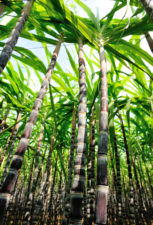 Sugar Cane in the Field via Shutterstock
Sugar Cane in the Field via Shutterstock
For years the public has been advised that sugar is bad — and to minimize its consumption. This presents a problem for the food industry which adds sugar (and here I mean sucrose or table sugar) to a myriad of products. Even foods that you don't think of as sweet, such as ketchup, contain sugar. So how does the industry, which is required to list a product's ingredients on the label, deal with the problem of admitting they add a "bad" ingredient to their products? By calling it something else, of course.
A popular euphemism for sugar is "evaporated cane juice ECJ)," especially in the organic and so-called natural foods markets. And to be sure, that's no lie. When sugar is produced from sugar cane, the cane stalks are crushed and the sweet juice is extracted. Then after it is cleaned, the juice is thickened by evaporation with steam into a syrup — its liquid is then boiled off — and voilà you have sugar. So while it's true that sugar is "evaporated cane juice" it's still sugar (and as a technical note, a similar process is used to produce sugar from sugar beets). It's hard to believe that this phrase is used for any reason but to lead consumers to believe that such products don't really contain added sugar.
Well, the FDA finally has something to say about this labeling trick. The agency has produced what it calls a "guidance" for industry. To be clear, such an instrument does not have the force of law — it is not binding and there are no penalties for ignoring it. As the agency said:
The purpose of this guidance is to enhance consumers’ ability to make informed choices among sweeteners by promoting accurate and consistent labeling.[T]his guidance is intended to advise the regulated industry of our view that the term “evaporated cane juice” is not the common or usual name of any type of sweetener and to assist manufacturers in appropriately labeling products that contain sweeteners derived from the fluid extract of sugar cane.
Further, the FDA said it finds that use of ECJ to be confusing and misleading because consumers might confuse it with the more commonly used word juice that means the liquid expressed from fruits or vegetables, for example. It adds that ingredients should be listed by their common names. To my knowledge, no one goes to the grocery store to buy five pounds of evaporated cane juice — the term simply isn't in the public's vocabulary. thus, the agency advises that the term sugar be used, to be sure that consumers understand what they are buying.
While we applaud the agency's action to make food labels more clear, it took a long time to do so. A draft guidance was first issued in 2009, and it took nearly seven years to produce this final document! And the food industry doesn't have to abide by it. We can only hope that this guidance is the beginning of a move to make such advice binding on the industry — with penalties for not following the rules.
